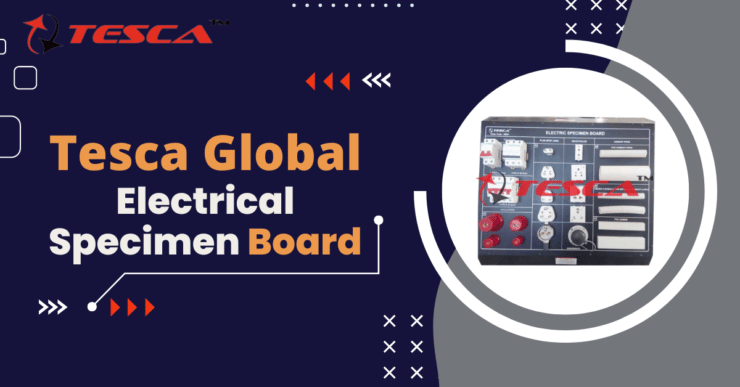Table of Contents
Electrical Specimen Boards are not just a piece of wood or other material written electrical details of several machines and components. They contain many educational features that help engineers understand concepts by making the work easier.
It is the kind of thing that you’ll find in every electric workshop and helps in hands-on learning. Let you know more about electrical specimen board:
Electrical Specimen Board: Uses, Components, Setup, Types & Price
What is Electrical Specimen Board?
An electrical specimen board is a board containing a variety of different electrical components. These components can be used to create a variety of different electrical circuits.
By studying the different components on the board, one can learn about the creation of electrical circuits. Electrical Specimen Boards are mainly useful in studying different electrical components and devices.
It is a small sample board that enables users to connect to different devices. From isolators, plugs, receptacles, insulators, conduit pipes, etc., it is an ideal device for testing purposes.
The device is also useful for conducting experiments with the help of various devices like conduit pipes, plugs, receptacles, etc.
Uses of Electrical Specimen Board:
- Electrical Specimen Board is useful in testing the quality of electrical parts. These boards are made up of different types of components, mostly electrical.
- The board is useful for displaying electrical devices such as switches, sockets, and other types of electrical equipment and for displaying electrical wiring diagrams.
- It has a variety of settings that help test the performance and functionality of various electronic components.
- It helps to organize the workspace systematically so that testing and troubleshooting of electrical systems becomes easier.
- An electrical specimen board is a great tool for engineering students to learn about electrical isolators and insulators. By using this board, students can see how these two types of materials work together to keep electrical currents flowing in a safe and controlled manner.
- By understanding how electrical isolators and insulators work, students can gain a better understanding of how to design and build electrical systems that are safe and efficient.
Read Also: Discrete Component Trainer: It’s Not as Difficult as You Think
Working Principle of Electrical Specimen Board:
An electrical specimen board consists of several different electrical components connected in a specific way.
The board connects to a power source, and one can place the material that one wants to test on the board. The board is then able to measure the electrical properties of the material.
The working principle of an electrical specimen board is simple: it distributes electricity from the main power supply to the various electrical circuits. It helps make it easy to troubleshoot any problems that may arise.
Components of Electrical Specimen Board:
An electrical specimen board typically contains a variety of components.
These components include isolators, insulators, receptacles, PVC conduit pipes, plugs, and other electrical devices.
These components are useful for protecting and connecting electrical circuits. Isolators are useful for isolating electrical circuits from each other, while insulators are useful for protecting electrical circuits from external sources of interference.
Receptacles connect electrical circuits to external power sources, while plugs are useful for connecting electrical circuits. It determines the proper functioning of these components and ensures they are safe for use.
Read Also: Importance of Power Electronics Lab Trainer Tools
Electrical Specimen Board Setup:
An electrical specimen board is typically set up with a power source, switch, and other components that connect with the power source. The power source is usually a battery, but it can also be the main power supply.
The switch turns the power on and off, and the other components are used to test the electrical components. When setting up an electrical specimen board, it is important to consider the specific needs of the project at hand.
Types of Electrical Specimen Board:
Different types of electrical specimen boards have been designed to study different electrical components.
Each type of board has its unique features and benefits that make it ideal for studying that particular type of component. They can be made of different materials, such as wood, metal, or plastic.
They are available in different sizes and shapes. Some boards have holes so that you can insert wires or other components. Others have special areas for soldering or mounting components. You can also find boards that have both holes and special areas. The type of board you need will depend on the project you are working on.
Electrical Specimen Board Price:
The specimen board is an important piece of equipment for any electrical engineer. It allows for the easy testing and experimentation of different electrical components and circuits.
The price of a specimen board can vary depending on several factors, such as the size of the board, the number of components it can accommodate, and the quality of the components. Generally, the price of a specimen board ranges from INR 8000 to INR 50000.
Tesca Global Electrical Specimen Board:
The Tesca Global Electrical Specimen Board is a great way to study different electrical insulators, isolators, conduit pipes, plugs, and receptacles. It is a versatile and essential tool for any electrical engineer. It is a compact, portable board that can be useful for testing and troubleshooting various electrical systems and components.
The board features a variety of sockets and jacks that allow for easy connection of various types of electrical test equipment.
The Electrical Specimen Board is an essential tool for any engineer who works with electrical systems. This board allows you to see how each type of material works and how it affects the electrical system’s overall performance.
With this board, you can test different materials and see which ones work best for your needs. Some of the specifications of this Electrical Specimen Board are:
- It comes with Isolators, plugs, and Receptacles.
- C25 m6 conical busbar insulator sets provide reliable electrical insulation at low voltages up to 1500V. Ideal for use in various applications, these insulators are easy to install and come in sets of 01.
- The dimensions of this product are 600mm x 455mm. It is made of aluminum steel for the user’s safety, rigidity, and contrast. It is fixed on an iron box that has been powder-coated black.
- PVC conduit pipe comes in two sizes, ½ inch and 1 inch. It’s a liquid flexible nonmetallic conduit pipe perfect for your electrical needs.
- PVC casing & caping: Also available in two sizes, 1 inch and 1½ inch, this type of capping are essential for a neat and professional-looking job.
The electrical specimen board is an essential piece of equipment for every electrical test lab. It helps to control the electrical parameters so that they are very easy to measure by anyone. If you are looking for a perfect specimen board, you can rely on Tesca Global. Tesca Global has been committed to providing high-quality products for you in your Lab or office. Get your from them today!






Add comment